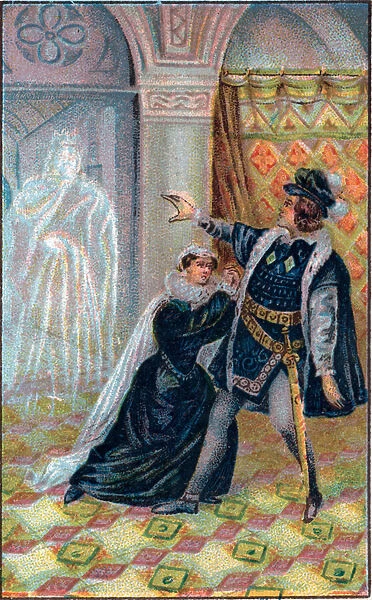In the play "Hamlet," the character of the Ghost plays a crucial role in driving the plot forward and influencing the actions of the other characters. The Ghost is believed to be the spirit of Hamlet's father, the former King of Denmark, who has come back from the dead to reveal the truth about his murder at the hands of his brother, Claudius.
The appearance of the Ghost is first mentioned in Act I, Scene 1, when Marcellus and Barnardo, two of the castle guards, see the Ghost walking on the ramparts of Elsinore Castle. They are alarmed by this strange sight and call for Horatio, a scholar, to come and see it for himself. Horatio is skeptical at first, but when he sees the Ghost for himself, he becomes convinced that it is the spirit of the late king.
The Ghost's appearance sets the stage for the rest of the play, as it serves as the catalyst for Hamlet's journey of revenge. When Hamlet learns of the Ghost's existence and the revelation of his father's murder, he becomes consumed with grief and determination to avenge his father's death. This desire for revenge ultimately leads to a series of tragic events, including the death of several characters, including Hamlet himself.
The Ghost serves as a constant presence throughout the play, appearing to Hamlet several times to urge him to take action and avenge his father's murder. In some ways, the Ghost represents Hamlet's conscience, reminding him of his duty to his father and the importance of seeking justice. However, the Ghost's influence on Hamlet is not always positive, as it pushes him towards a path of violence and destruction.
One of the most interesting aspects of the Ghost's character is the question of its reliability. Is the Ghost truly the spirit of Hamlet's father, or is it a deception, perhaps sent by the devil or by Claudius himself? This ambiguity adds to the play's overall sense of uncertainty and mistrust, as the characters are never quite sure who or what to believe.
In conclusion, the Ghost is a complex and multifaceted character in "Hamlet," serving as both a driving force for the plot and a source of moral guidance for the main character. Its appearance and revelation of the truth about the late king's murder set the stage for the tragic events that unfold throughout the play.







